Not Going Quietly is an internationally acclaimed documentary from director Nicholas Bruckman, following progressive activist and ALS sufferer Ady Barkan as he embarks on a nationwide campaign for healthcare reform, in spite of his declining physical abilities. The feature, which has screened at SXSW Festival and Tribeca, tracks Ady’s rise to political stardom after his confrontation with a powerful senator goes viral, igniting a once-in-a-generation movement for universal healthcare.
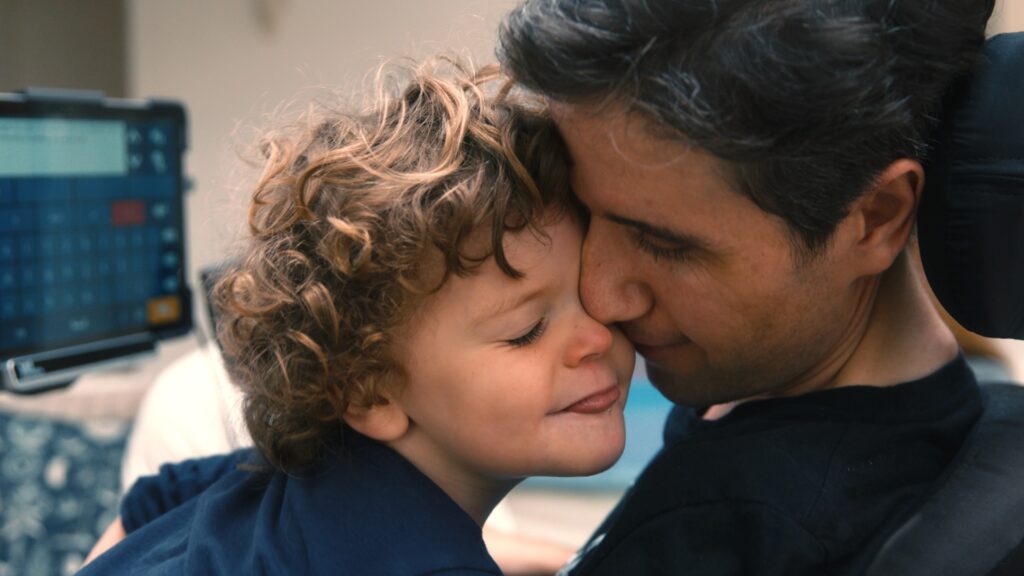
Executive produced by Mark and Jay Duplass, Not Going Quietly is an intimate and inspiring look at Ady’s personal journey, exploring his relationships with his son Carl and wife Rachael, as well as his political fight. Outtake spoke with Nicholas Bruckman about following Ady, his cause, and how this film works as a guide to starting a political movement.
After a few delays for the release of Not Going Quietly, it’s interesting that this discussion around healthcare and accessibility has become even more relevant.
Nicholas Bruckman: I like to think so. At first, we thought that this had to come out before the 2020 presidential election… but really, we chronicle how activism and advocacy transcend election work, how to engage in active citizenry, and the importance of holding elected officials accountable. That’s what Ady does, whether they’re Democrats or Republicans. Towards the end of the film, ahead of the 2020 elections, you see him pushing even the most progressive politicians like Bernie Sanders and Elizabeth Warren – as he is doing with Joe Biden right now – towards making substantive policy changes and moving the country towards universal healthcare. So yes, to your point, it has become more relevant because it’s asking, “what do we do now, and how do we move forward?”.
And now with Biden as president, it’s better that you didn’t make a film that was overly focused on the Trump presidency and its effects on healthcare, but rather to show it as an ongoing problem.
Nicholas Bruckman: Yeah, exactly. I think there was something incredibly coincident about the birth of Ady’s baby, his diagnosis, and the election of Donald Trump all coming within weeks of each other. And there’s a level of irony to being given a certain amount of time to live under a Trump presidency. He had spent his entire life fighting for progressive causes, long before he had ALS. In fact, he was expecting to be part of some of the economic work in the incoming Hillary Clinton administration. He had been rising in that space and working on economic issues for Black and brown people in America and working-class folks.
We only really touch on it in the first four minutes of the film, but he had a long history of activism and so, the incoming Trump presidency combined with the birth of his son and his diagnosis was just this incredible catalyst for him to say, “fuck it, I’m going to get out and use the last couple of months I have left to speak to try to change this country.” Not Going Quietly is certainly not about Donald Trump, but about what we do in the darkest moments of our lives with the time we have left.
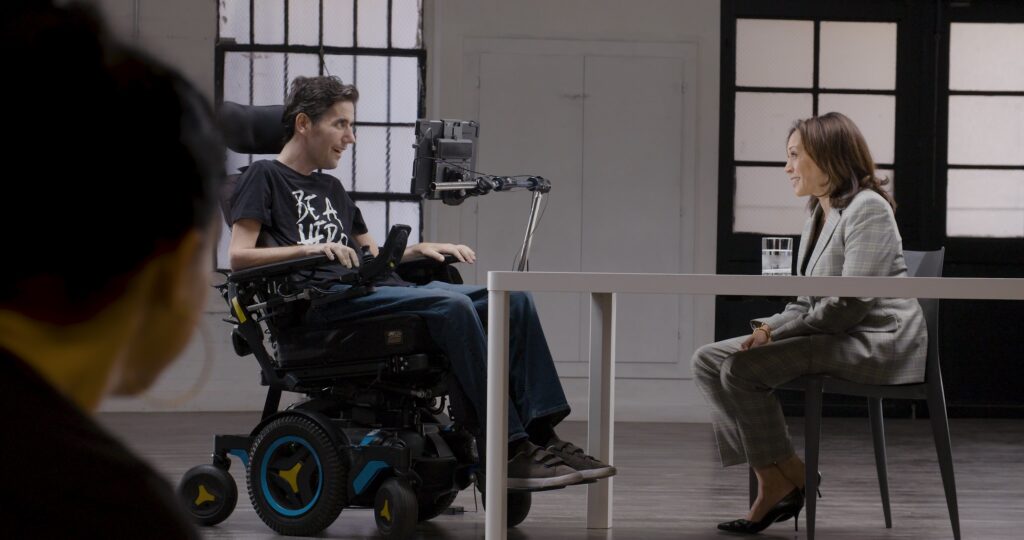
Going back to the beginning, when did you know you wanted to make a feature documentary about Ady’s life?
Nicholas Bruckman: I met Ady right after he had encountered Jeff Flake. At that time, he had already been diagnosed for a year. I have a production company called People’s Television and we do a lot of work helping progressive candidates, campaigns, causes, and corporations working on environmental and social issues, to tell their story. Mostly that’s in short form video; it’s just a great intersection between my advocacy work and my artistic work as a filmmaker. And that was the capacity in which I was connected to Ady because Liz Jaff, who is this amazing firecracker activist, consultant, and strategist, got in touch with me through a mutual friend. And she basically said, “I just met this amazing guy on an aeroplane, he’s got this disease and he wants to launch a non-profit/political action committee to fight for healthcare.” So we came on to make a two-minute launch video for that.
I flew up to Santa Barbara to meet him and I guess I imaged it was going to be this sad story about an ailing father with this terminal illness, who wants to fight for a better world for his son. But within the first five minutes of shooting Ady, I knew straightaway that he wasn’t only amazing and resilient, but he also demonstrated such keen insight in recognising that his condition, this whole tragedy, could really be a weapon to help make a better world. And of course, his sense of humour in general – which comes through in the film – was what made me want to spend time with this guy.
That was the impetus, and towards the end of making this promo film for the Be A Hero campaign, I floated the idea of a long-form observational documentary. It would not only explore the experience of ALS in an intimate way and be there in the worst moments, but we’d also take a look under the hood at how social movements can be built. And that’s really what the film is about: the personal is political. And it’s not just his story, it’s the way that activists on the tour encourage people in smaller cities and districts across America to share their stories with representatives, and then the women who, after reports of sexual assault were brought against Brett Kavanaugh, shared their stories in the halls of the Capitol. All that affects change in the nation’s consciousness. We certainly never could have imagined where it would go, or that we’d be sitting down with the now Vice President.
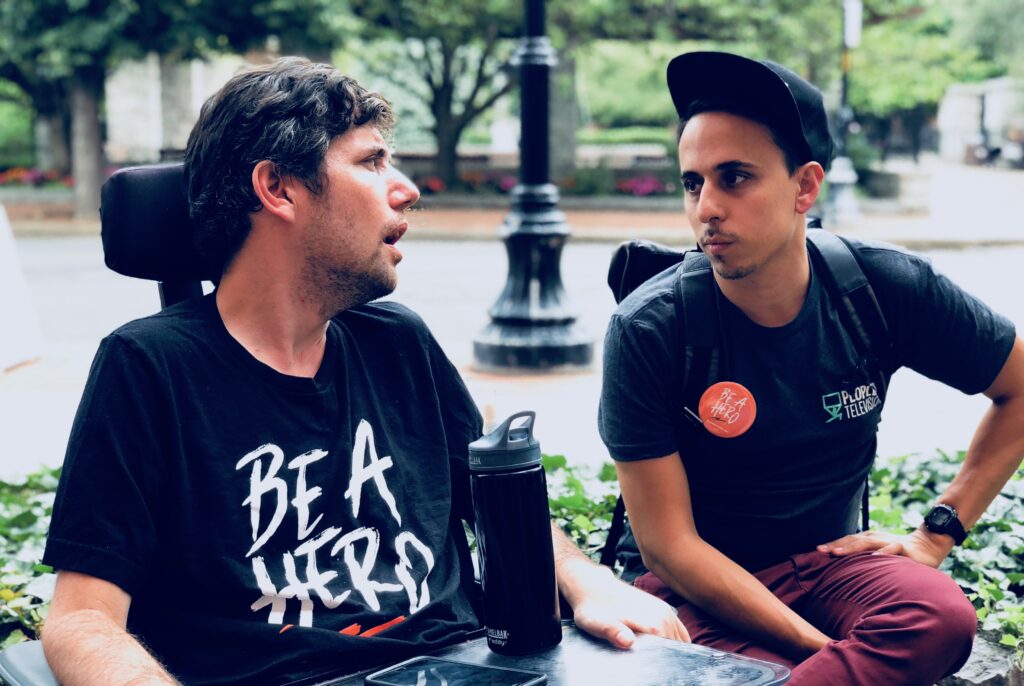
I imagine your vision for Not Going Quietly would have been dictated mostly by events that are out of your control, so did you find that overall narrative once you’d finished filming, or did you pick up the thread along the way?
Nicholas Bruckman: My editor Kent Bassett, our producer Amanda Roddy and I edited for over a year. We began editing long before we finished shooting. We never really knew when we would finish shooting, and of course some developments transpired that we didn’t know about in advance, but one of those events was a very appropriate way to close the film. The ending was always very elusive, but that event was a very complete and cathartic closure to Ady’s arc. So that, we had to chase.
In terms of the structure, I did try to dictate and shoot that arc that happens – the first act is his backstory and seeing what drove him to leave his family and embark on this tour. That critical moment, we knew would be the setup for the film, and then the road trip became that driving arc for the second act. Then that victory in the 2018 midterm elections was something we thought might be the end of the film, but then the story unfolded in pretty incredible ways from there.
I think with documentary filmmaking in general, especially with this kind of character-driven storytelling, you can’t just roll the camera all the time. On the other hand, you absolutely have to be open and receptive. And sometimes that means looking for small cues from your subject – Ady talked a lot about what he might do after he was completely paralysed, and so we got hints about what might happen in the near future. There were also murmurings that he might testify in Congress, so we had that on our scene outline… you need to shape the story.
I don’t pretend to be objective about the issues that Ady is passionate about. I come from an activist background, I strongly believe the US needs a universal healthcare single-payer programme, and I knew the film would try to advance some of those causes. And yet, I also wanted it to transcend politics and explore that core theme of how to turn something tragic into a cause for hope.
In terms of ethics and with Ady having a limited amount of time with his voice and mobility, having a newborn at home and going through such a vulnerable time personally… How did you ensure that you presented his story in a non-sanitised way, while still being respectful of the family’s privacy and their space?
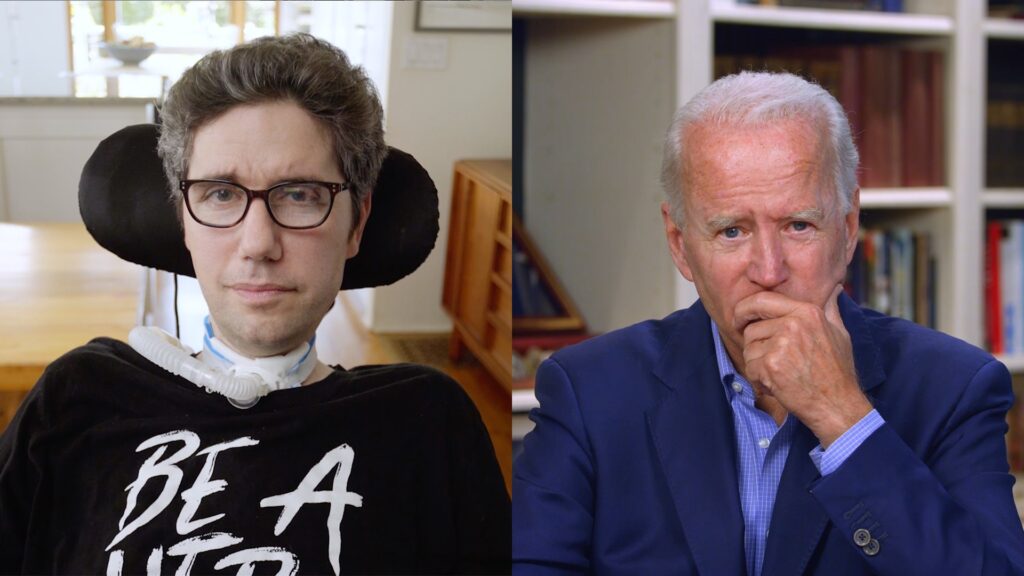
Nicholas Bruckman: That was really important to all of us from the get-go. I think that Ady really wanted to share his life, and understood intuitively how his own intimacy and vulnerability could help advance the causes that he believes in. On the other hand, you raise a very good point regarding the amount of speaking he could do, which was quite limited. We couldn’t just talk to him all the time because he could only really say so many words in a day. We don’t interview him much in the film, and that was an ethical choice; if he spent an hour talking to us, he might not be able to have a conversation with Carl or Rachael that night. The ethics informed some of the artistic choices, and made the film more of an observational, cinema verité piece.
Like you said earlier too, Not Going Quietly explores how to organise a political movement in America – how do you expect the film will translate with international audiences?
Nicholas Bruckman: In some ways it’s such an American story, but the film really has resonated with people outside the US. Just the other day we won the Jury Prize at the PyeongChang International Peace Film Festival in Korea. And it’s very moving for me to see that it has resonated in that way. It’s funny too that most of the work I’ve done has been very international – I’ve directed a feature documentary in Bolivia, a narrative film in India, and I come from an immigrant background, so staying in America was unusual for me.
But certainly, the key political issue that Ady is fighting for, which is this universal, single payer healthcare system, that can be a little confusing to people outside the US. Yet what we’ve found is that, even countries that have these systems in place still need to do a huge amount of advocacy within their systems in order to achieve greater equity and better healthcare outcomes for everybody. For example, when we screened in Canada (which I think has a very enviable system compared to the US), they talked about the difficulty in getting long-term and at-home care like the kind ALS patients need.
And of course, the film is not just about healthcare, it’s about how people get together and fight collectively to create the kind of society they want. And that transcends any single issue, and seeing the film resonate outside of the US proves that there’s very universal aspects to the story of Ady’s fight. And again, ALS and other neurological diseases obviously transcend borders, as does the question of balancing your work and your family. This is a piece of US storytelling and advocacy that will resonate with audiences everywhere.
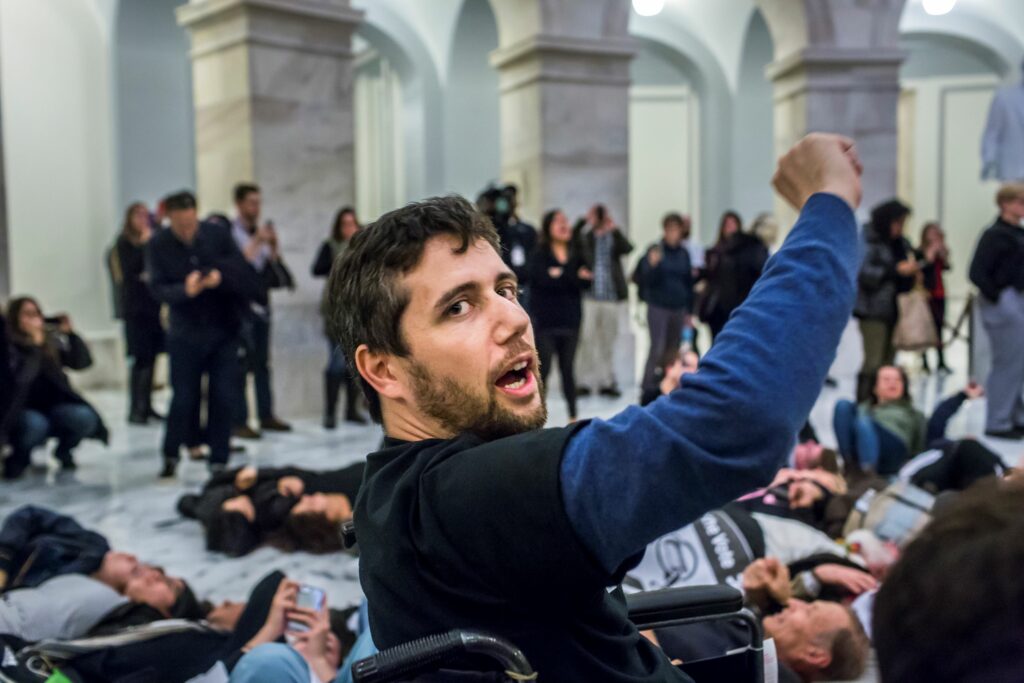
You spent four years with Ady, and you mentioned that you yourself now have a newborn son. So, on a more personal note, how has working on this film affected you personally?
Nicholas Bruckman: It’s been the privilege of a lifetime to spend so much time with Ady Barkan. Certainly, I was always very interested in activism and advocacy; I’ve been involved in protest groups since the George W. Bush administration and was very active in fighting against the Iraq war and the War on Terror in general, and that last iteration of extremist right-wing agenda in the US. But in subsequent years, I’ve kind of shifted into filmmaking and had not been doing the kind of on-the-ground organising that I saw Ady doing. I think I’d become jaded, partly from seeing George Bush re-elected. At that point, I thought I would make films to address the obviously huge education problem in the US. But seeing Ady’s work made me reconnect to that activist background.
And my baby is now four months old, the exact age that Ady’s son was when he was diagnosed. So I’ve been thinking a lot about, if this happened to me right now, whether I would be able to find meaning in what was happening to me and turn it into something beautiful and powerful, something that made meaning for others. Or would I turn inward and lose hope? It could happen to any of us.
And so I hope that what people take away from this film is, if you are struck with that kind of loss – and it could be anything, loss of a loved one, a health outcome, something valuable that’s taken away – there is something deep within that which can benefit others, that you can gain from and that can make the world a little bit better.
Not Going Quietly releases in US theatres August 13th, and on Vice World News later this year.
